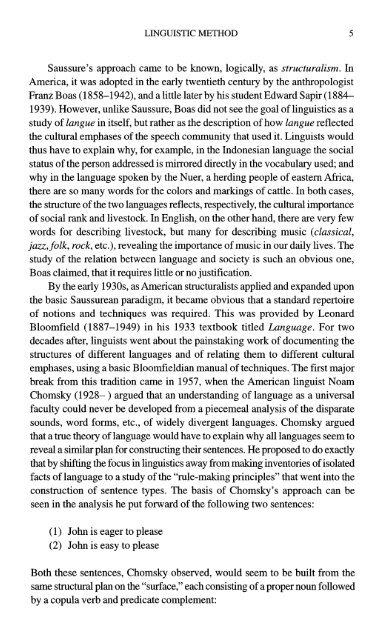A Basic Course in Anthropological Linguistics (Studies in Linguistic ...
A Basic Course in Anthropological Linguistics (Studies in Linguistic ...
A Basic Course in Anthropological Linguistics (Studies in Linguistic ...
You also want an ePaper? Increase the reach of your titles
YUMPU automatically turns print PDFs into web optimized ePapers that Google loves.
LINGUISTIC METHOD 5<br />
Saussure’s approach came to be known, logically, as structuralism. In<br />
America, it was adopted <strong>in</strong> the early twentieth century by the anthropologist<br />
Franz Boas (1 858-1942), and a little later by his student Edward Sapir (1 884-<br />
1939). However, unlike Saussure, Boas did not see the goal of l<strong>in</strong>guistics as a<br />
study of langue <strong>in</strong> itself, but rather as the description of how langue reflected<br />
the cultural emphases of the speech community that used it. L<strong>in</strong>guists would<br />
thus have to expla<strong>in</strong> why, for example, <strong>in</strong> the Indonesian language the social<br />
status of the person addressed is mirrored directly <strong>in</strong> the vocabulary used; and<br />
why <strong>in</strong> the language spoken by the Nuer, a herd<strong>in</strong>g people of eastern Africa,<br />
there are so many words for the colors and mark<strong>in</strong>gs of cattle. In both cases,<br />
the structure of the two languages reflects, respectively, the cultural importance<br />
of social rank and livestock. In English, on the other hand, there are very few<br />
words for describ<strong>in</strong>g livestock, but many for describ<strong>in</strong>g music (classical,<br />
jazz, folk, rock, etc.), reveal<strong>in</strong>g the importance of music <strong>in</strong> our daily lives. The<br />
study of the relation between language and society is such an obvious one,<br />
Boas claimed, that it requires little or no justification.<br />
By the early 1930s, as American structuralists applied and expanded upon<br />
the basic Saussurean paradigm, it became obvious that a standard repertoire<br />
of notions and techniques was required. This was provided by Leonard<br />
Bloomfield (1887-1949) <strong>in</strong> his 1933 textbook titled Language. For two<br />
decades after, l<strong>in</strong>guists went about the pa<strong>in</strong>stak<strong>in</strong>g work of document<strong>in</strong>g the<br />
structures of different languages and of relat<strong>in</strong>g them to different cultural<br />
emphases, us<strong>in</strong>g a basic Bloomfieldian manual of techniques. The first major<br />
break from this tradition came <strong>in</strong> 1957, when the American l<strong>in</strong>guist Noam<br />
Chomsky (1928- ) argued that an understand<strong>in</strong>g of language as a universal<br />
faculty could never be developed from a piecemeal analysis of the disparate<br />
sounds, word forms, etc., of widely divergent languages. Chomsky argued<br />
that a true theory of language would have to expla<strong>in</strong> why all languages seem to<br />
reveal a similar plan for construct<strong>in</strong>g their sentences. He proposed to do exactly<br />
that by shift<strong>in</strong>g the focus <strong>in</strong> l<strong>in</strong>guistics away from mak<strong>in</strong>g <strong>in</strong>ventories of isolated<br />
facts of language to a study of the “rule-mak<strong>in</strong>g pr<strong>in</strong>ciples” that went <strong>in</strong>to the<br />
construction of sentence types. The basis of Chomsky’s approach can be<br />
seen <strong>in</strong> the analysis he put forward of the follow<strong>in</strong>g two sentences:<br />
(1) John is eager to please<br />
(2) John is easy to please<br />
Both these sentences, Chomsky observed, would seem to be built from the<br />
same structural plan on the “surface,” each consist<strong>in</strong>g of a proper noun followed<br />
by a copula verb and predicate complement:






